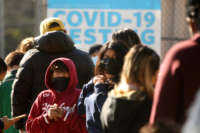
When Houston resident Paul Middendorf woke up congested one early morning this month, he decided to get tested for COVID-19. He found a COVID-testing pop-up site in the East Montrose neighborhood of Houston and joined the approximately 40 others in line to get a test. A worker went down the line sharing a QR code for people to scan and fill out their information, including their driver’s license, phone number, address, email, date of birth, and health insurance.
As he filled out the form, he noticed that certain aspects of the testing site were unusual. The testing seemed disorganized and the site did not have much signage. Unlike other places he had been tested, the workers did not give him a vial to store his nasal swab.
“I was just holding it walking up to the crowd and asked, ‘What am I supposed to do with this swab, there’s no tube to put it in,’ and he’s like, ‘Oh, you just put it back in the wrapper, and then you put it back in the baggie, and then you put it in this bucket,’” Middendorf said. “That seemed really weird. Also, that’s not how you do a PCR.”
The recent surge in Omicron cases has generated a colossal demand for COVID-19 tests, and a draining supply of rapid tests and dwindling appointment availability at testing centers has created a vacuum for a new flood of unapproved testing sites.
Unauthorized pop-up testing sites are spreading in cities across the country, including Chicago, Philadelphia, Houston, San Antonio, San Francisco, and many others, with officials warning that scammers may be seeking to charge fees and obtain personal information such as social security numbers through fraudulent operations.
“There has been an increase in people wanting to be tested that contributed to long wait times and may have also contributed to unscrupulous operators taking advantage of the situation,” said Cleo Garcia, spokesperson for the San Antonio Metropolitan Health District (SAMHD). She added that supply chain issues have been the biggest barrier faced by licensed testing providers.
The U.S. Department of Health and Human Services Office of the Inspector General released a fraud alert on Jan. 4 warning that personal information collected through COVID-19-related scams like illegitimate testing “can be used to fraudulently bill federal health care programs and commit medical identity theft.”
The site Middendorf attended was run by the Center for COVID Control, an organization that has come under scrutiny in the last few days after receiving numerous complaints to city health departments and the Better Business Bureau about failure to provide results and suspicious testing and reporting practices.
Scott Packard, the spokesperson for the Houston Health Department, told Prism that HHD works with several agencies to provide free testing sites across the city, and that it inquires about safety protocols, laboratory certification, logistics, and other elements of testing before listing them as HHD-affiliated.
“Center for COVID Control is not an HHD partner agency,” Packard confirmed.
Douglas Loveday, the spokesperson for the Texas Department of State Health Services, said that the Center for COVID Control is not reporting to DSHS, a violation of the governor’s orders. Other state health agencies such as the Oregon Health Authority have also not received any test results from the company. The Center for Covid Control is currently under investigation by Departments of Justice in several states, including Texas, Oregon, and Illinois. On Jan. 13, the company announced a “one-week pause on all operations” due to “increased scrutiny by the media into the operations of [its] collection sites.”
The Center for COVID Control did not respond to repeated phone calls and emails for comment. Its website says it offers testing at over 300 locations. As of Jan. 14, the website is password locked.
While COVID-19 tests have been increasingly inaccessible to everyone and fraudulent testing sites have appeared in a range of neighborhoods, low-income and Black, Indigenous, and communities of color may be disproportionately affected by the spread of fraudulent test sites. BIPOC have faced a disparity in testing availability throughout the pandemic, with fewer test sites available, longer lines, and fewer staff. Rep. Sheila Jackson Lee, who represents Houston, said some of the illegitimate testing sites are targeting low-income and immigrant communities. SAMHD has received complaints from six zip codes, five of which represent low-income neighborhoods. The mass distribution of incorrect testing results poses a significant public health and privacy risk.
“If you’re testing to get a negative result to see your grandparents in an old folks home, you could very well be spreading COVID because they’re giving you a fraudulent test result,” said Middendorf.
Matthew Rankin, spokesperson for the Philadelphia Department of Public Health, said there are a number of steps individuals can take to check the legitimacy of a testing site.
- Ask who the testing site is affiliated with and check with the facility that the testing site is co-located with. Legitimate testing sites will partner with the facility they are set up at and the facility should vouch for them.
- Look for logos of institutions on the paperwork and signage at the testing site; call those institutions to make sure the testing site is legitimately affiliated with them.
- Check your local health department website to see if the site is listed as an approved testing site.
Rankin added that COVID-19 testing sites may ask for your insurance but should not charge for testing. Testing sites should also not ask for your social security number.
Prism is an independent and nonprofit newsroom led by journalists of color. We report from the ground up and at the intersections of injustice.
This post was originally published on Latest – Truthout.